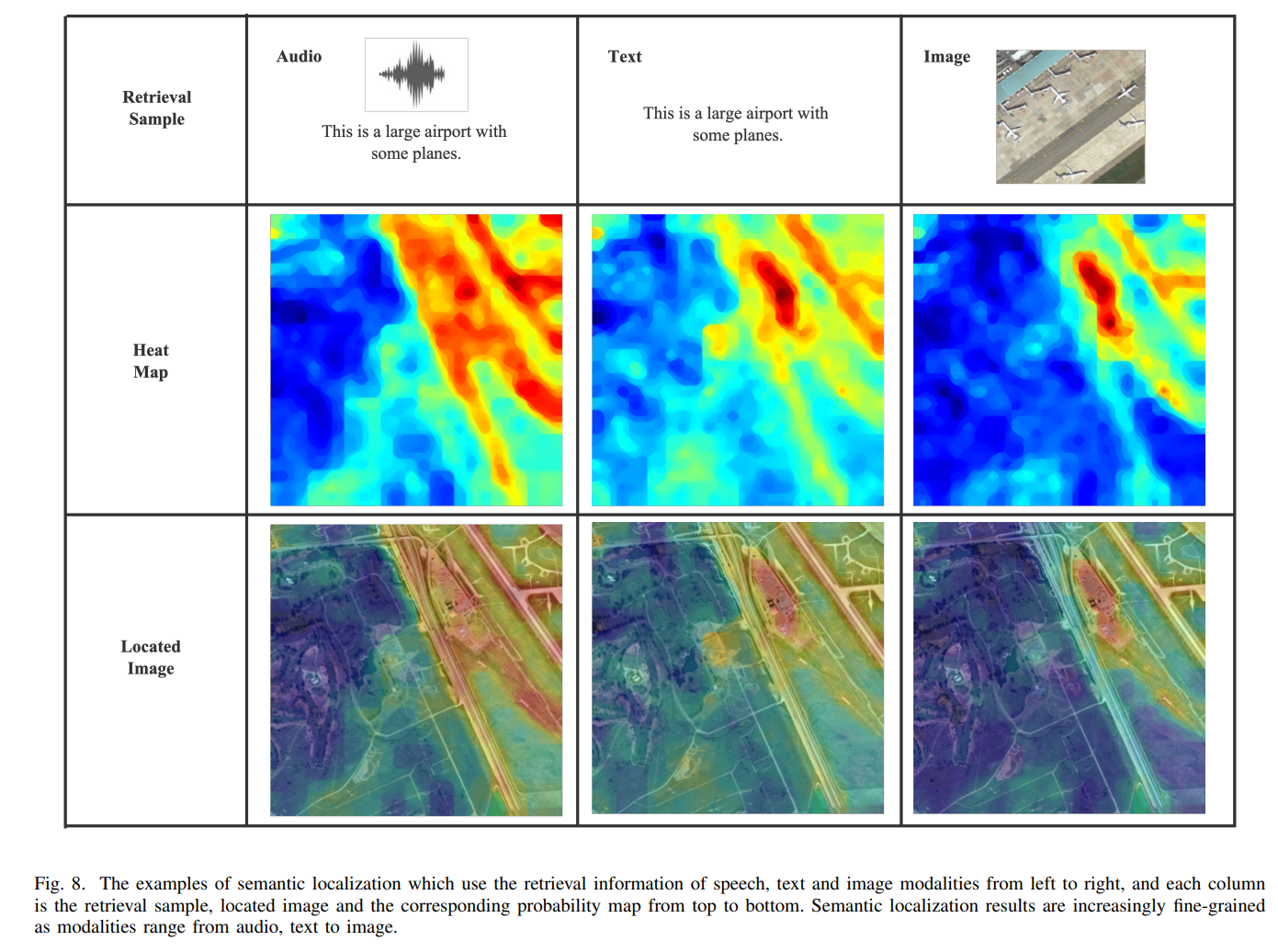Zhiqiang Yuan, Changyuan Tian, Wenkai Zhang, Yongqiang Mao, Hongqi Wang, and Xian Sun.
This paper proposes a multi-source cross-modal retrieval network for remote sensing based on contrastive learning and generative adversarial networks. The designed model establishes a shared feature space through modal entanglement and multimodal shared encoding, which in turn yields a common representation of multiple information sources at the semantic level. To cope with the lack of annotation data in the RS scene, we construct a unified unimodal self-supervised pretraining method, utilizing a large amount of unlabeled data for pre-training to obtain modal-unbound robust parameters. We also construct a multisource multimodal RS dataset to promote RSCR task, and utilize the constructed RS multimodal sample pairs to alignment semantics under different modalities based on the multitask learning.
Installation
We recommended the following dependencies:
Python 3
PyTorch > 0.3
Numpy
h5py
nltk
yamlFile Structure:
-- checkpoint # savepath of ckpt and logs
-- data # soorted anns of four datesets
-- rsicd_precomp
-- train_caps.txt # train anns
-- train_filename.txt # corresponding imgs
-- train_audios.txt # train audio specs, which correspond to caption
-- test_caps.txt # test anns
-- test_filename.txt # corresponding imgs
-- test_audios.txt # test audio specs, which correspond to caption
-- images # rsicd images here
-- rsitmd_precomp
...
-- layers # models define
-- option # different config for different datasets and models
-- vocab # vocabs for different datasets
-- seq2vec # some files about seq2vec
-- bi_skip.npz
-- bi_skip.npz.pkl
-- btable.npy
-- dictionary.txt
-- uni_skip.npz
-- uni_skip.npz.pkl
-- utable.npy
-- dataloader
-- data,py # load data
-- engine.py # details about train, pretrain and val
-- test.py # test k-fold answers
-- train.py # main file
-- utils.py # some tools
-- vocab.py # generate vocab
Note:
1. In order to facilitate reproduction, we have provided processed annotations.
2. We prepare some used file::
(1)[seq2vec (Password:NIST)]([https://pan.baidu.com/s/1jz61ZYs8NZflhU_Mm4PbaQ](https://pan.baidu.com/s/1FOPldSGO6ctETiXMlPGC8g))
(2)[RSICD images (Password:NIST)](https://pan.baidu.com/s/1lH5m047P9m2IvoZMPsoDsQ)
(3)[RSITMD images (Password:NIST)](https://github.com/xiaoyuan1996/AMFMN/tree/master/RSITMD)
(4)[Audio mel-spectrums for above two datasets (Password:NIST)](https://pan.baidu.com/s/1QlUTctzv2meU-dY_S26wUg)Run: (We take the dataset RSITMD as an example)
Step1:
Put the images of different datasets in ./data/{dataset}_precomp/images/
--data
--rsitmd_precomp
-- train_caps.txt # train anns
-- train_filename.txt # corresponding imgs
-- test_caps.txt # test anns
-- test_filename.txt # corresponding imgs
-- images # images here
--img1.jpg
--img2.jpg
...
-- audio_specs # audios here
--1.jpg
--2.jpg
...
Step2:
Modify the corresponding yaml in ./option.
Regard RSITMD_AMFMN.yaml as opt, which you need to change is:
opt['dataset']['audio_path'] # change to audio_specs path
opt['dataset']['image_path'] # change to image path
opt['model']['seq2vec']['dir_st'] # some files about seq2vec
Step3:
Bash the ./sh in ./exec.
Note the GPU define in specific .sh file.
cd exec
bash run_rsitmd_wo_pretrain.sh
Note: We use k-fold verity to do a fair compare. Other details please see the code itself.If you feel this code helpful or use this code or dataset, please cite it as
Z. Yuan et al., "MCRN: A Multi-source Cross-modal Retrieval Network for Remote Sensing," in International Journal of Applied Earth Observation and Geoinformation, doi: 10.1016/j.jag.2022.103071.

